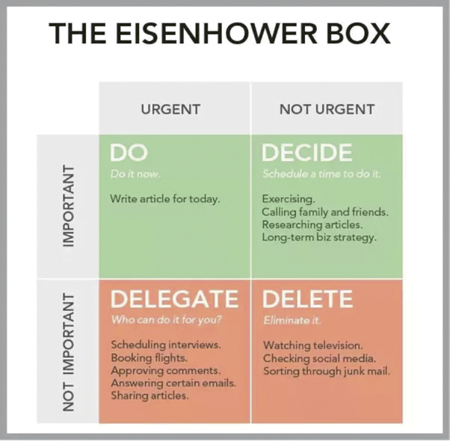Beyond Insurance
Keys to take control of your time rather than letting time control you
Procrastination is a challenge we have all faced at one point or another. For as long as humans have been around, we have been struggling with delaying or avoiding action on some issue that matters to us. Sometimes we wait because we just don’t care enough about the project, but other times we care a lot—and still end up doing something else.
Do you have too much to do and too little time to do it? Do you have tons of emails in your inbox? Are your family priorities adding up? If so, you’re not alone. In today’s hectic, always connected world, the 24/7 mindset drives us into what seems like perpetual action. Too many demands on your time can lead to a scarcity mindset, in which you are so busy running around taking care of the problem right in front of you that you neglect to take actions or make decisions that will help you in the long run. The key is to take control of your time rather than letting time control you.
Take care of the rocks first: the things that really matter. Set your priorities. The rest is just sand.
It starts with prioritizing projects and making a choice among working now on a given task, working on a different task, or doing nothing at all. Research confirms that your decision to work on a task is driven by how much value you assign to a specific project at that moment—what psychologists call its subjective value. And procrastination, in psychological terms, is what happens when the perceived value of doing something else outweighs the value of working on a project now.
This way of thinking suggests a simple trick to defeat procrastination: Find a way to boost the subjective value of getting a chosen project done now, relative to the value of other things on your plate. Consider increasing the value of the project, decreasing the intensity of the distraction, or achieving some combination of the two.
The human brain values immediate rewards more than future outcomes. You cannot rely on long-term consequences and rewards to motivate your present self. You must gain discipline in moving future rewards into the present moment. Your future consequences must become present consequences.
Here’s an example to illustrate the concept. Let’s say you have a major project. You have known about it for weeks and continued to put it off day after day. You have experienced some nagging pain and anxiety about the task, but not enough to motivate you to take immediate action. Then, suddenly, the day before the deadline, the future consequences turn into present consequences, and you complete the project in the nick of time. The pain of procrastinating was so intense that you finally took action.
The problem is so timeless, in fact, that ancient philosophers like Socrates and Aristotle developed the word akrasia to describe the state of acting against your better judgment. This happens when you do one thing even though you know another project is more important.
Rory Vaden, co-founder of Southwestern Consulting and author of Procrastinate on Purpose, uses the term “priority dilution” to describe this phenomenon. Priority dilution occurs when you delay today’s most important activities by consciously or unconsciously allowing your attention to shift to a less important task. Priority dilution has nothing to do with being lazy, apathetic, or disengaged. It affects top performers and chronic overachievers. It’s human nature to prioritize projects that offer instant gratification.
Rocks, pebbles, and sand
A philosophy professor stood before his class with a glass jar and proceeded to fill it to the top with large rocks. He then asked his students if the jar was full. The students agreed that it was. The professor then took a box of pebbles and rolled them into the openings between the rocks. He once again asked: “Class, is the jar full?” The class nodded. The professor then picked up a bag of sand and poured it into the jar. The sand quickly filled the porous areas between the rocks and pebbles. The jar was now full.
“Now,” said the professor, “I want you to recognize that this jar represents your life. The rocks are the most important things in your life—your spouse, partner, or children—things that if everything else was lost and only they remained, your life would be full. The pebbles are other things that matter—like your friends, profession, home, and car. The sand is everything else. The small stuff.
“If you put the sand into the jar first,” he continued, “there is no room for the pebbles or rocks. The same goes for your life. If you spend your time on the small stuff, you will never have room for the things that are really important to you. Pay attention to things that are critical to your happiness and future well-being. Take care of the rocks first: the things that really matter. Set your priorities. The rest is just sand.”
The Eisenhower Box
Dwight Eisenhower, the 34th President of the United States, is considered the most productive president in history. Serving two terms from 1953 to 1961, he founded the Defense Advanced Research Projects Agency (DARPA) and the National Aeronautics and Space Administration (NASA). He signed the Atomic Energy Act, which offered the peaceful use of alternative energy sources, and the Federal-Aid Highway Act, which launched the development of the U.S. interstate highway system.
 Before becoming president, he was a five-star Army general, served as Supreme Commander of the Allied Forces in Europe during World War II, and was responsible for planning and executing the invasions of North Africa, France, and Germany.
Before becoming president, he was a five-star Army general, served as Supreme Commander of the Allied Forces in Europe during World War II, and was responsible for planning and executing the invasions of North Africa, France, and Germany.
At other points along the way, he served as the president of Columbia University, became the first Supreme Commander of NATO, and somehow found time to pursue hobbies like golfing and oil painting.
Eisenhower had an incredible ability to sustain his productivity not just for weeks or months but for decades. For that reason, his methods for time management, task management, and productivity have been studied by many people.
His most famous productivity strategy is known as the Eisenhower Box—a simple decision-making tool you can use to prioritize your actions based on four possibilities:
Urgent and important—tasks you will do immediately.
Important, but not urgent—tasks you will schedule to do later.
Urgent, but not important—tasks you will delegate to someone else.
Neither urgent nor important—tasks you will eliminate.
Although the Eisenhower Box isn’t a perfect strategy, it is a useful tool for increasing productivity and eliminating the “sand” that drains your mental energy, wastes time, and rarely moves you toward your goals.
Ways to overcome procrastination
Recognize that you are procrastinating. Become aware of the habits, thoughts, and actions that fill your day with low-priority tasks.
Attempt to understand why. It may be a particular task that you find boring or unpleasant. Possibly you lack good organizational skills or simply feel overwhelmed by the project.
Adopt anti-procrastination systems. These may include keeping a to-do list, prioritizing the to-do list using the Eisenhower Box, master scheduling and project planning, and tackling the hardest projects when you have the most energy and are most effective.
Reevaluate long-term goals and objectives. Reflect on your strengths, weaknesses, and priorities. Implement the Rocks, Pebbles, and Sand concept.
Make the rewards of procrastination immediate. Bring future rewards to the present moment. Reward yourself with a meaningful gift or fun activity when you have achieved a task that you could have delayed or avoided.
Break down large projects into manageable components. When confronted with a sizable task, attempt to organize it in bite-sized pieces.
Establish daily routines for peak productivity. At the end of each work day, write down the three most important projects you need to accomplish tomorrow. When you arrive in the morning, concentrate on the first task. Work until it is finished and then reward yourself.
Restrict interruptions. Don’t take phone calls. Put a hold on responding to emails. If necessary, close your office door or put a “please do not disturb” sign on your cubicle.
Say “no” to extra commitments that don’t serve your goals. Before agreeing to an extra activity, think carefully about how the project supports your future vision of success.
Seek guidance. Even after applying steps one through nine, you may experience fear, anxiety, and loss of confidence. Reach out to a professional. Your health and well-being are too important to neglect.
The author Alyce P. Cornyn-Selby said: “Procrastination is, hands down, our favorite form of sabotage.” Remember to take care of the rocks first: the things that really matter. Set your priorities. The rest is just sand.
The author
Scott Addis is CEO of Beyond Insurance and an industry leader. His agency was recognized by Rough Notes magazine as a Marketing Agency of the Month, he was a Philadelphia finalist for Inc. Magazine’s “Entrepreneur of the Year” award, and he was selected as one of the “25 Most Innovative Agents in America.”
Beyond Insurance is a consulting firm that offers leadership training, cultural transformation, and talent and tactical development for enlightened professionals who are looking to take their organization to the next level. Since 2007, the proven and repeatable processes of Beyond Insurance have transformed agencies as measured by enhanced organic growth, productivity, profitability, and value in the marketplace. To learn more about Beyond Insurance, contact Scott at saddis@beyondinsurance.com.






